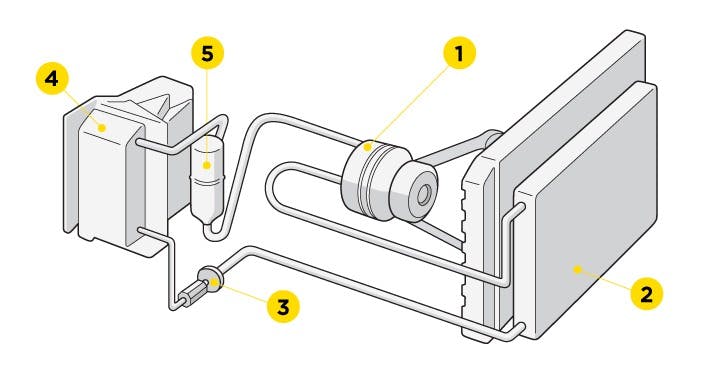How Your Car’s Heater Works (Or Doesn’t)
At A/C Pro, we’re focused on helping people stay cool with our do-it-yourself car A/C repair kits.
But, when winter approaches and temperatures drop, drivers switch off the A/C and turn on the heater. Since heaters and air conditioners are so closely related, to the point that they share some of the same parts, we’ll explain how the whole climate control system really works and what to do if the heat doesn’t work in your car.
Find out how:
- The ins and outs of the car heater system works.
- How the controls operate the temperature inside the car.
- What can go wrong with the heating system, and how to fix it.
The heater uses a similar-looking part called the “heater core.” Instead of just being like a radiator, though, the heater core literally is a radiator. It looks and works just like a smaller version of the radiator at the front of your car.
A radiator needs coolant to work. Coolant is a roughly 50/50 mix of water and antifreeze which is pumped through the engine to keep it from overheating. The engine warms the coolant, sometimes to near-boiling temperatures (about 200F). The hot liquid then flows through the radiator, where the heat is absorbed by air flowing through its metal fins.
When you turn on your car’s heater, the hot coolant flows from the engine to the heater core, which is located inside the car’s dash. A fan (the same one used by the air conditioner) blows air through the heater core, with the heated air then passing through the car’s vents and warming the interior.
The controls
How does a single fan and vent system provide either hot, cold, or somewhere-in-between air? The key is a series of small doors which open or close to direct the air where it’s needed.
One door opens to allow air through the heater core when you turn the heater on, and closes off the core when the A/C is on. If you want air that’s only slightly warm, the door will only open part way, so that only some of the air gets heated.
Other doors control which vents the air flows through, directing air to the defroster, floor, or dashboard vents depending on what settings you choose.
What could go wrong?
We don’t make car heater repair kits, but it’s still helpful to know what can cause a heater to stop working, and what you can do to fix it.
Slow heat
Car heaters draw their heat from the engine (unless you have an electric car, in which case the heat is generated by electricity). So, your heater won’t produce any heat until the engine warms up. And since the heater core works like a second radiator, it actually helps cool your engine and keep it from warming up as quickly. So, you can get hot air faster by waiting until the engine warms up before turning on the heater.
No heat, but hot engine and low coolant
A heater can’t warm up if it doesn’t get any coolant from the engine. If the coolant level gets too low, the heater will stay cold, while the engine itself will start to overheat, and that’s bad. You’ll want to stop, shut the engine off, and check the coolant level. If it’s low, you’ll need to add coolant, and then find and fix the leak. (Check the passenger-side floorboard; if it’s damp, the leak is probably inside the heater core itself.)
No heat, but hot engine and full coolant
If your heater is cold and your engine is overheating, but the coolant level is normal, it suggests the coolant is not circulating through the system. That could mean you have a bad water pump, since it is responsible for circulating the coolant. Or it could be that the thermostat, which is a valve that regulates the flow of coolant through the engine, is stuck in the closed position. Either part would need to be replaced.
No heat, and cold engine
If the engine runs unusually cold and doesn’t warm up as you drive it, you probably have a thermostat stuck in the open position. Replacing the thermostat would fix the problem.
No heat, but normal engine temperature and coolant level
The door which is supposed to open and let air through the heater core may be stuck closed.
Hot air, but little or no airflow, even with the fan on its highest setting
Your blower fan may be broken. If that’s the case, your A/C also won’t work until you get the blower replaced.
If the heat doesn’t work in your car, some of these heater repairs may be simple enough for you to do them yourself, but none of them are quite as easy and foolproof as using A/C Pro to fix your air conditioner.




